National Award 2020
2020 Industry Master Award - Xiang-peng Rui
No more casts for broken bones! His invention has made the aids lightweight and comfortable.
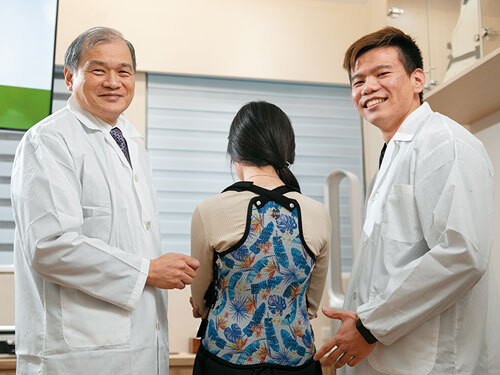
Traditionally, when a fracture occurs, the doctor puts the patient in a cast. But casts are boring and heavy, making the affected area itchy and uncomfortable. Now, this problem is solved. Taiwan has developed the world's first non-toxic, non-hazardous, 3D fabric thermoplastic composite material. Not only is it lightweight, breathable and malleable, but it can also be reused as long as it is heated by a hair dryer at home. The driving force behind this innovative medical invention is Taipei Tech professor Xiang-peng Rui.
“It can be used for medical treatment, sports protection, and even as a backpack carrier for elementary school students to prevent scoliosis, so it's very versatile,” says Xiang-peng Rui. As he explains, Xiang-peng Rui puts the heated white fabric over his hand and folds it to fit his hand. When it cools down after a while, the white fabric becomes hard again.
This amazing 3D fabric thermoplastic composite material can be molded into various shapes through temperature changes. In the lab, you can see wrist guards, neck brace, thigh brace, scoliosis back brace, helmet, etc. made of it. This innovative composite material has earned Rui the third National Award for Distinguised Contribution to Industry-Academia Cooperation, the 2019 Future Technology Award, and the 2019 Pioneer of Academic Entrepreneurship Award from President Ing-wen Tsai.
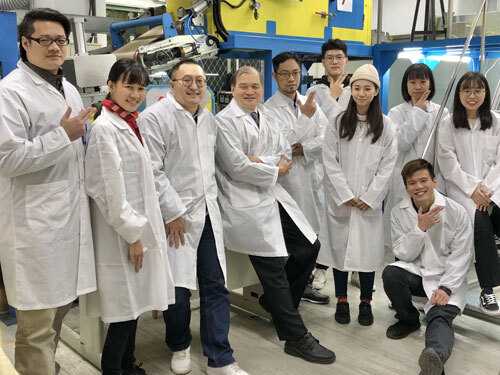
At first, he encountered a lot of difficulties in searching for materials. Xiang-peng Rui failed many times to find a material that is soft above 70 degrees Celsius, hard at room temperature, friendly to the environment and harmless to the human body. In fact, 3D fabric is not a new technology. In the past, it was most commonly used in the uppers of sports shoes for its breathable properties. “But if you add other materials to 3D fabric to make it a composite material, it can lead to all kinds of innovations,” Rui said. His research was originally focused on polymer synthesis and processing, with a specialty in coating technology, and he has been involved in the development of various new organic materials.
A few years ago, an appliance manufacturer came to Taipei Tech to develop a lighter medical appliance, asking him to develop a new composite material to replace plaster. Rui knew that Allard, a Swedish company, already had a 3D fabric thermoplastic composite, but Allard's product had a low-dose organic residue, which was unfriendly to the environment and the human body, and the material's lifespan was only one year. Since the product has room for improvement and there is a demand from the industry, Xiang-peng Rui began to lead his colleagues and students to form a team and started to research and develop this new material.
Getting through setbacks with a “failure-proofing” program
Over the past three years, failure has become a common occurrence for Xiang-peng Rui. But he has a tenacity and has never given up.
Xiang-peng Rui said that he would first give himself a “preventive shot” and every time he encountered difficulties, he would tell himself, “What is the worst situation? Can I accept it?” He puts the worst-case scenario into his plan first, and then he lets it go.
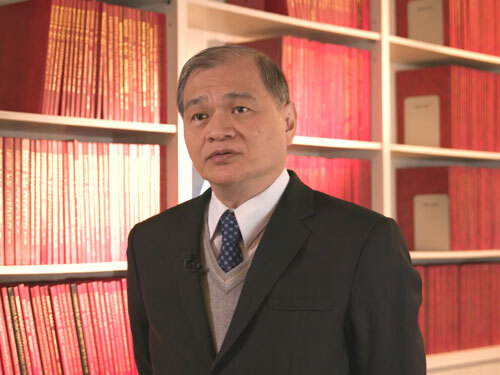
Initially, the team spent a lot of time searching for coating materials suitable for bonding to fiber fabrics. With the understanding of polymer properties, we successfully developed a series of polyurethane or polyester materials that can produce high crystallization at low temperatures. Because these products are thermoplastic composites that can be reused, they are more environmentally friendly than the thermoset composites that are widely used in the aerospace industry.
However, the material compounding technology is a big challenge. In order to evenly coat the polymer on the fabric, after many attempts, we finally overcame the danger of flammability and explosiveness of many organic solvents, and developed a safe and environmentally friendly thermoplastic composite material process. What's more, its weathering resistance exceeds three years, surpassing international competitors by a wide margin.
In 2018, Xiang-peng Rui participated in the first “The TRUST-U Program” competition organized by the Ministry of Science and Technology with this composite material idea, and fifteen projects were selected from more than two hundred teams, and Xiang-peng Rui's team won the competition and was awarded with a high amount of R&D subsidy. He commercialized this “3D fabric thermoplastic composite” and established “TSM Smart Materials”, which was invested by Long-Cai Yan, Chairman of Mechema, who is also a distinguished alumnus of Taipei Tech, Shi-Xiong Wang, Chairman of T&T Industries Corp. and a number of industry pioneers, and raised 120 million dollars of venture capital in total. The total amount of venture capital raised was 120 million dollars.
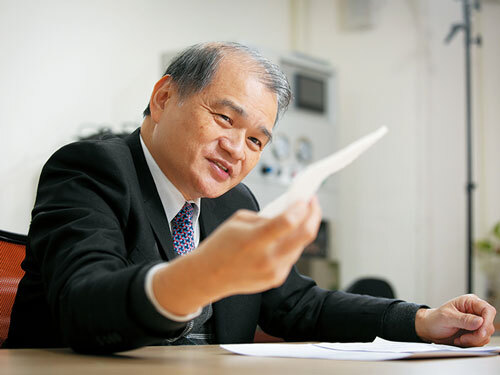
From professor to founder of a new company, “The new company has set up a factory in Longtan, Taoyuan, and has started to get orders!” Xiang-peng Rui said happily. Currently, many major hospitals in Taiwan have become his clients and are officially using his products.
Read everything well and do your best.
After graduating from National Taiwan University with a degree in chemical engineering, Xiang-peng Rui went to Clarkson University to study chemical engineering and then to Case Western Reserve University to complete his PhD in polymers. Having been in the chemical field all along the way, reporter asked if he was particularly interested in chemistry? Xiang-peng Rui smiled, thought about it, and answered with a metaphor: “I think I'm a rapeseed person,” he said. No matter what field of study he is in, he will always study it well and fulfill his studies, and he will do his best in everything without thinking too much about it.
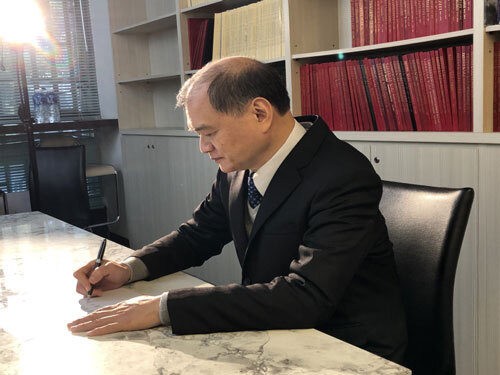
He recalled that the time when he was studying in the United States was actually very bitter. At that time, he had just gotten married, his eldest daughter had just been born, and the family of three was living on a limited scholarship. In order to make experimental results, he often stay in the laboratory until midnight before going home, and it is even harder to work in the snowy winter evening. "Just find a way!" Xiang-peng Rui said. During the years of hard study, it was just a matter of doing it, with no shortcuts.
After completing his doctoral studies in the United States, Rui worked for four years at the U.S. R&D center of BASF, one of the world's leading chemical companies, before returning to Taiwan to take care of his mother, who was sick and needed dialysis. He was fortunate to have this industrial experience and to see how BASF researched a material to its fullest extent. “The molecular formula of nylon, which originated for military use in World War II, is written in a single line. But BASF took professional engineers on a three-day course,” he says, impressed. This spirit of seriousness and in-depth research has been embedded in his heart ever since.
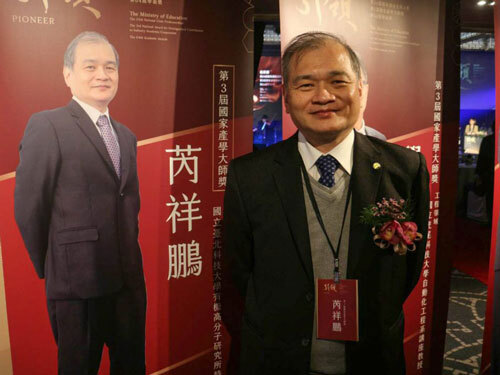
“Material theory is important, but teachers must be able to give real-life examples of industrial applications so that students will be able to understand them,” he says. Now that he teaches at the University of Technology, Rui knows that professors must interact more with enterprises and bring the industry's new product trends back to the classroom at any time. He observes that this is the key to the upgrading of Taiwan's chemical industry, “In the near future, the era of electric vehicles, gasoline consumption will be sharply reduced, and the chemical industry will have to figure out how to turn the excess oil into other environmentally friendly materials,” Xiang-peng Rui pointed out. Under the trend of environmental protection, the chemical industry must continue to make breakthroughs in order to develop high-priced and environmentally friendly materials.
Another opportunity is the integration of materials with other industries such as electrical and mechanical. Xiang-peng Rui is now preparing for his second company, this time integrating LED components in textile fabrics and working with professors from the Department of Information Technology and the Department of Electrical and Mechanical Engineering to develop the necessary fabric circuit design and control hardware and software, which will lead to innovations in wearable devices that can be applied in the long-term care and public safety fields. Industry players, including Brave C&H Supply Co., Ltd. and Polycore Co., have been working closely with Taipei Tech for this new product.
Xiang-peng Rui is engaged in academic research, mentoring students, and organizing new ventures. In his busy life, how does he cope with all the pressures? He thought for a moment and said, “Listen to music!
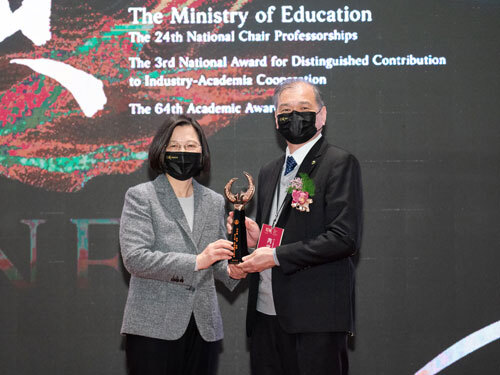
Xiang-peng Rui is also a fan of classical music. He and his wife Li-Ling met at the Philharmonic Society of NTU. When it comes to classical music, Xiang-peng Rui can't stop talking about it: “I prefer to listen to romantic music, because that's the way to release my emotions. From the Russian national music of Tchaikovsky and Rachmaninoff, you can hear the desolation of Siberia and the sadness and joy of life,” he says.
Looking back on his journey, Xiang-peng Rui summarizes his motto: “Keep a curious mindset and strengthen your practical ability”. He said that with curiosity, he has the motivation to keep moving forward. Plus, he likes to do things with his hands, so no matter what field he puts his hands on, he will surely achieve something. Indeed, Xiang-peng Rui himself is the best example, isn't it?
